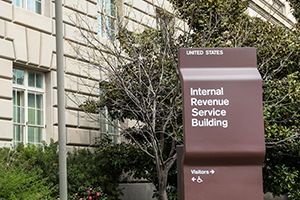What you need to know if one of your tax returns is stuck
 The IRS is coping with a backlog of historical proportions and it is impacting millions of taxpayers. According to IRS sources, as of July 31, there are still over 13 million tax returns that are to be processed. The nearly unprecedented delay is being attributed to the COVID-19 pandemic, under staffing at the IRS, and a slew of recent tax law changes. The challenge is how to navigate the IRS notices if you are caught up in this mess.
The IRS is coping with a backlog of historical proportions and it is impacting millions of taxpayers. According to IRS sources, as of July 31, there are still over 13 million tax returns that are to be processed. The nearly unprecedented delay is being attributed to the COVID-19 pandemic, under staffing at the IRS, and a slew of recent tax law changes. The challenge is how to navigate the IRS notices if you are caught up in this mess.
Complicating your tax life
- You’ve filed for an extension via mail, but the IRS says you haven’t filed your return yet and issues notices and penalties.
- You keep getting letters from the IRS after responding to initial inquiries.
- You filed your tax return on time, but the IRS says it doesn’t have your return, even though you may have received a confirmation.
What you can do
While you may not be able to get your tax return processed any faster, there are steps you can take to stay informed and make it easier for the IRS to work with your tax situation:
- Track your refund status. The IRS has developed an online tool, “Where’s My Refund?” that can provide updates. Find it at https://www.irs.gov/refunds.
- Check out IRS2Go. The agency also provides a mobile app called IRS2Go that checks your tax refund status. You can see if your return has been received, approved, and sent.
- Stay calm and keep responding. If the IRS sends you notices, keep detailed records of the notices and your timely replies. Eventually, they will get caught up. So keep good records by leaving a digital footprint and back up electronic records with paper versions.
- Prior correspondence is your friend. When you’re replying to IRS notifications, attach copies of prior correspondence with your latest letter. Make it easy for the IRS to follow your paper trail by dating each response and keeping the most recent response on top.
- Keep proof of delivery. Use express delivery or certified mail to confirm that the IRS receives your responses in a timely manner.
Remember that the IRS is working as quickly as it can to clear this backlog.
In late 2020, the IRS announced that it will increase tax audits of small businesses by 50 percent in 2021. Here are several mistakes to avoid if you do get audited by Uncle Sam.
- Mistake: Missing income. A long history of investigating has led IRS auditors to focus on under-reported income. If you’re a business that handles cash, expect greater scrutiny from the IRS. The same is true if you generate miscellaneous income that’s reported to the IRS on 1099 forms. Be proactive by tracking and documenting all income from whatever source. Invoices, sales receipts, profit and loss statements, bank records—all can be used to substantiate income amounts.
- Mistake: Higher than normal business losses. Some small businesses struggle in the early years before becoming profitable. If your company’s bottom line never improves, the IRS may view your enterprise as a hobby and subsequently disallow certain deductions. As a general rule, you must earn a profit in three of the past five years to be considered a legitimate business.
 Mistake: Deductions lacking substantiation. Do you really use your home office exclusively for business? Does your company earn only $50,000 a year but claim charitable donations of $10,000? Do you write off auto expenses for your only car? The key to satisfying auditors is having clear and unequivocal documentation. They want source documents such as mileage logs that match the amount claimed on your tax return and clearly show a business purpose. If you can’t locate a specific record, look for alternative ways to support your tax return filings. In some cases, a vendor or landlord might have copies of pertinent records.
Mistake: Deductions lacking substantiation. Do you really use your home office exclusively for business? Does your company earn only $50,000 a year but claim charitable donations of $10,000? Do you write off auto expenses for your only car? The key to satisfying auditors is having clear and unequivocal documentation. They want source documents such as mileage logs that match the amount claimed on your tax return and clearly show a business purpose. If you can’t locate a specific record, look for alternative ways to support your tax return filings. In some cases, a vendor or landlord might have copies of pertinent records.- Mistake: No expense reports. If you use your credit card for business, create an expense report with account numbers and attach it to each statement. Then attach copies of the bills that support the charges. This is an easy place to blend in personal expenses with business expenses and auditors know it.
- Mistake: No separate books, bank accounts or statements. Never run personal expenses through business accounts and vice versa. Have separate bank accounts and credit cards. A sure sign of asking for trouble is not keeping the business separate from personal accounts and activities.
- Mistake: Treat the auditor as an enemy. Auditors have a job to do, and it’s in your best interest to make their task as painless as possible. Try to maintain an attitude of professional courtesy. If you’re called to their office, show up on time and dress professionally. If they come to your place of business, instruct staff to answer questions honestly and completely.
 New Year’s resolutions get a bad rap — and for good reason. They are wildly unsuccessful. Millions of people have well-intentioned aspirations for the New Year, but only about one in 10 actually accomplish their goal, according to the Statistic Brain Research Center.
New Year’s resolutions get a bad rap — and for good reason. They are wildly unsuccessful. Millions of people have well-intentioned aspirations for the New Year, but only about one in 10 actually accomplish their goal, according to the Statistic Brain Research Center.
If you dig a little deeper into the reasons why they fail, you find it’s usually not the resolution itself, it’s in the execution. Here are four popular New Year’s resolutions and how to avoid messing them up:
- Resolution #1: Becoming healthier. The most popular resolution can take on many forms — losing weight, getting in better shape, eating healthier, and so on. This resolution usually fails because to be successful, it takes a major lifestyle change. You’re fighting against months or maybe years of poor behaviors, so expecting wholesale changes right out of the gate is not reasonable.
Make it fail-proof: Start with smaller, simpler goals like not eating after 8 p.m., or exercising for 20 minutes a day for three times a week. Hitting manageable goals will build momentum and create good habits. - Resolution #2: Spending less money. Depending on how much you spent on Christmas, this one might take care of itself for a few weeks. But if you don’t have a spending plan or budget, old spending habits will re-emerge.
Make it fail-proof: Take some time at the beginning of the year to jot down some long-term spending and savings goals and then work backwards to figure out how those goals will affect your weekly purchases. As the year goes on, continue to track your progress and evaluate your purchases. - Resolution #3: Getting more organized. Going from being disorganized to organized is not a quick fix. To make the switch, it takes an evaluation of your entire environment. Most people don’t have the time for such an extensive process so they buy some bins, stuff them full and call it good. That’s not going to work and it’ll cost you money.
Make it fail-proof: Instead, start small. Pick one room in your house or one aspect of your life to focus on, like health care bills or your tax documents. Once you get some traction, you can apply the methods you learned to other things. Incremental improvement is the best long-term approach. - Resolution #4: Spending less time on electronics. If this is a resolution that’s important to you, odds are you’ve had some trouble keeping electronic usage under control. With so many games, social media and streaming options at our fingertips, our brains are now conditioned to be engaged electronically at all times.
Make it fail-proof: One way to start to break this habit is to change the accessibility you have to your devices. Remove apps from your phone and keep your devices out of reach when you don’t need them. Another way to curb electronic usage is to form a different habit, such as reading.
Resolutions, whether at New Year’s or any other time, are a good thing. To be successful, more planning and attention are required than most people think. And if you slip up, don’t quit! Learn from your mistakes and keeping going.